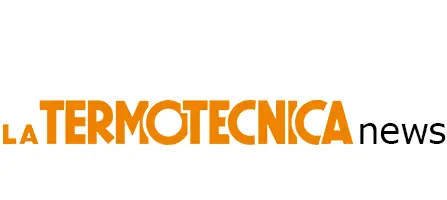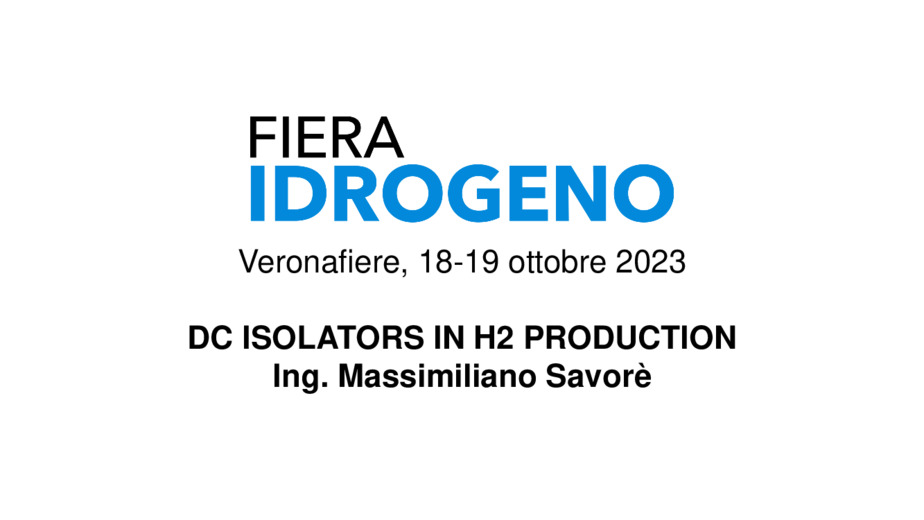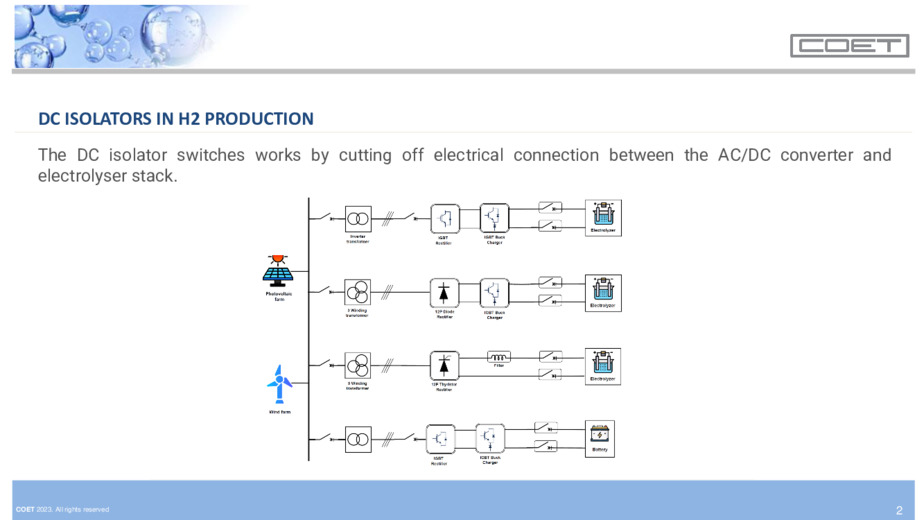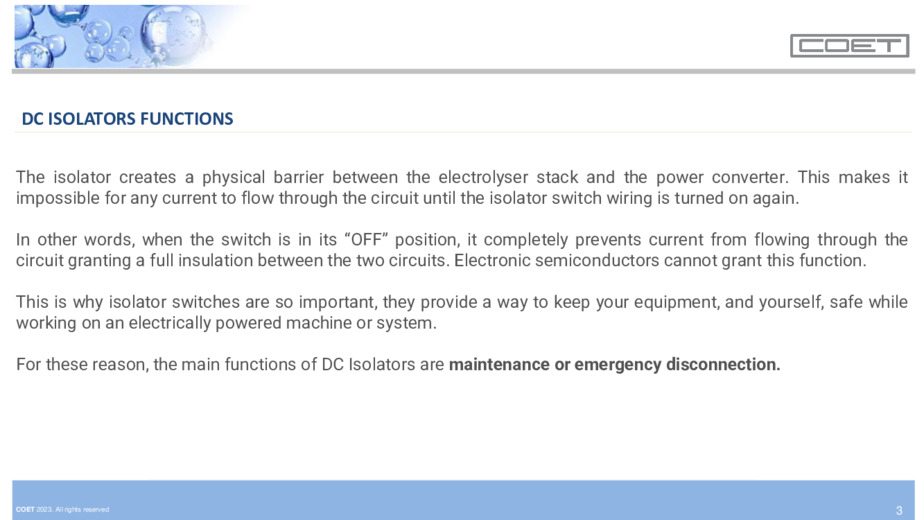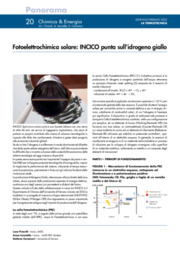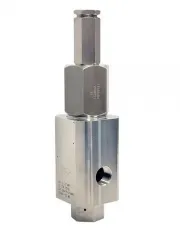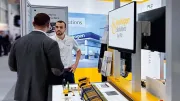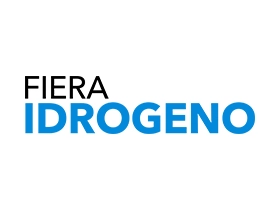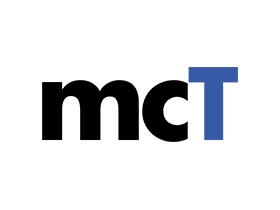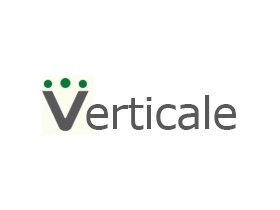DC Isolators for Green Hydrogen production
Massimiliano Savorč - COET
(in lingua inglese)
- DC isolators in H2 production
- DC isolators functions
- DC isolators design
- DC isolators COET offering
- HCD disconnectors
The DC isolator switches works by cutting off electrical connection between the AC/DC converter and electrolyser stack. The isolator creates a physical barrier between the electrolyser stack and the power converter This makes it impossible for any current to flow through the circuit until the isolator switch wiring is turned on again.
In other words, when the switch is in its " position, it completely prevents current from flowing through the circuit granting a full insulation between the two circuits Electronic semiconductors cannot grant this functio
This is why isolator switches are so important, they provide a way to keep your equipment, and yourself, safe while working on an electrically powered machine or system. For these reason, the main functions of DC Isolators are maintenance or emergency disconnection.
The DC isolators is installed close to the converter in appropriate cabinet COET provide the design to integrate the DC Isolator with the balance of plant.
HCD DISCONNECTORS
Main Features:
- Main Contacts
Main contacts are made of pure copper with massive silver plating that guarantees a very low and constant contact resistance they are encapsulated and sealed for operation in very polluted and aggressive environments without affecting contact resistance and current rating.
- Breaking Pole
Used for On LOAD operations it is constituted by an Arc Chute with magnetic blow out system and large arc quenching chamber granting a very high performance rate up to 1200 Vdc.
- Arcing contacts
The disconnector is fitted with a "Early make/late break" contact that allows to break residual current that might exist even when the disconnector is off load and preserves the main contacts from any damage eventually produced by the arc generated when interrupting current.
- Disconnector Position
Mechanical indication of isolator position is given in a very visible and clear way.
- Emergency Manual operation
Manual operation allows to open or close the isolator manually in case of failure of the Motor or Pneumatic control For safety reason, insertion of manual operation lever cuts off motor power supply by means of a dedicated limit switch.
- Auxiliary Contacts
Auxiliary contacts for signalization of Disconnector's position, configurable on customer request, and emergency manual operation are sealed type with protection degree IP 67 (optional). Namur type contact available on request.
- Auxiliary Connector
All auxiliary and signal wires are connected to a 24 pole socket complete with its relevant plug with screw terminals and protection degree IP 65 for a very easy connection.
- Temperature Sensors
Temperature sensors give alarm and trip in case of over temperature of disconnector copper bus bars.
SFI DISCONNECTORS
The SFI line is a complete range of disconnectors suitable for AC and DC applications at different voltage levels A considerable number of pressure springs ensure an optimized contact surface limiting voltage drops and heating dissipation thus granting the highest level of performances foreseen by the standards.
Attached, you can download the full pdf of the presentation.
In other words, when the switch is in its " position, it completely prevents current from flowing through the circuit granting a full insulation between the two circuits Electronic semiconductors cannot grant this functio
This is why isolator switches are so important, they provide a way to keep your equipment, and yourself, safe while working on an electrically powered machine or system. For these reason, the main functions of DC Isolators are maintenance or emergency disconnection.
The DC isolators is installed close to the converter in appropriate cabinet COET provide the design to integrate the DC Isolator with the balance of plant.
HCD DISCONNECTORS
Main Features:
- Main Contacts
Main contacts are made of pure copper with massive silver plating that guarantees a very low and constant contact resistance they are encapsulated and sealed for operation in very polluted and aggressive environments without affecting contact resistance and current rating.
- Breaking Pole
Used for On LOAD operations it is constituted by an Arc Chute with magnetic blow out system and large arc quenching chamber granting a very high performance rate up to 1200 Vdc.
- Arcing contacts
The disconnector is fitted with a "Early make/late break" contact that allows to break residual current that might exist even when the disconnector is off load and preserves the main contacts from any damage eventually produced by the arc generated when interrupting current.
- Disconnector Position
Mechanical indication of isolator position is given in a very visible and clear way.
- Emergency Manual operation
Manual operation allows to open or close the isolator manually in case of failure of the Motor or Pneumatic control For safety reason, insertion of manual operation lever cuts off motor power supply by means of a dedicated limit switch.
- Auxiliary Contacts
Auxiliary contacts for signalization of Disconnector's position, configurable on customer request, and emergency manual operation are sealed type with protection degree IP 67 (optional). Namur type contact available on request.
- Auxiliary Connector
All auxiliary and signal wires are connected to a 24 pole socket complete with its relevant plug with screw terminals and protection degree IP 65 for a very easy connection.
- Temperature Sensors
Temperature sensors give alarm and trip in case of over temperature of disconnector copper bus bars.
SFI DISCONNECTORS
The SFI line is a complete range of disconnectors suitable for AC and DC applications at different voltage levels A considerable number of pressure springs ensure an optimized contact surface limiting voltage drops and heating dissipation thus granting the highest level of performances foreseen by the standards.
Attached, you can download the full pdf of the presentation.
Fonte: Fiera Idrogeno ottobre 2023 workshop
Parole chiave: Idrogeno
- BRUGG Pipe Systems
- Air Liquide Italia Service
- Fiera Idrogeno
- Fiera Idrogeno
 English
English
